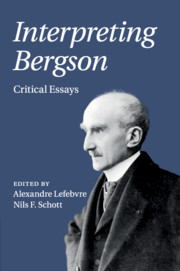Book contents
- Interpreting Bergson
- Interpreting Bergson
- Copyright page
- Contents
- Figures
- Contributors
- Abbreviations
- Introduction
- Chapter 1 Bergson’s Theory of Truth
- Chapter 2 What Was “Serious Philosophy” for the Young Bergson?
- Chapter 3 Bergson and Naturalism
- Chapter 4 Bergson on the True Intellect
- Chapter 5 Bergson’s Philosophy of Art
- Chapter 6 Bergson, the Time of Life, and the Memory of the Universe
- Chapter 7 Bergson and Philosophy as a Way of Life
- Chapter 8 Bergson and Social Theory
- Chapter 9 Bergson and Political Theory
- Chapter 10 Bergson, Colonialism, and Race
- Chapter 11 Bergson’s Philosophy of Religion
- Bibliography
- Index
Chapter 11 - Bergson’s Philosophy of Religion
Published online by Cambridge University Press: 22 November 2019
- Interpreting Bergson
- Interpreting Bergson
- Copyright page
- Contents
- Figures
- Contributors
- Abbreviations
- Introduction
- Chapter 1 Bergson’s Theory of Truth
- Chapter 2 What Was “Serious Philosophy” for the Young Bergson?
- Chapter 3 Bergson and Naturalism
- Chapter 4 Bergson on the True Intellect
- Chapter 5 Bergson’s Philosophy of Art
- Chapter 6 Bergson, the Time of Life, and the Memory of the Universe
- Chapter 7 Bergson and Philosophy as a Way of Life
- Chapter 8 Bergson and Social Theory
- Chapter 9 Bergson and Political Theory
- Chapter 10 Bergson, Colonialism, and Race
- Chapter 11 Bergson’s Philosophy of Religion
- Bibliography
- Index
Summary
Summarizing the results of Bergson’s inquiry into the realities generally referred to under the heading “religion,” the chapter identifies what Bergson calls the “specifically religious element” as love (the mystics’ word for the élan vital) in action. To account for its possibility, the chapter turns to Bergson’s use of the term “conversion,” which he consistently employs to describe qualitative change, and articulates the mystic experience as a conversion that aims at a creative transformation of humanity. The very terms in which Bergson couches this conversion call up and shed new light on major themes of Bergson’s philosophy, including liberty, the élan vital, and philosophical intuition. The conclusion of the essay addresses Bergson’s problematic “conversion” to Catholicism as an instance of love in action.
- Type
- Chapter
- Information
- Interpreting BergsonCritical Essays, pp. 193 - 210Publisher: Cambridge University PressPrint publication year: 2019

